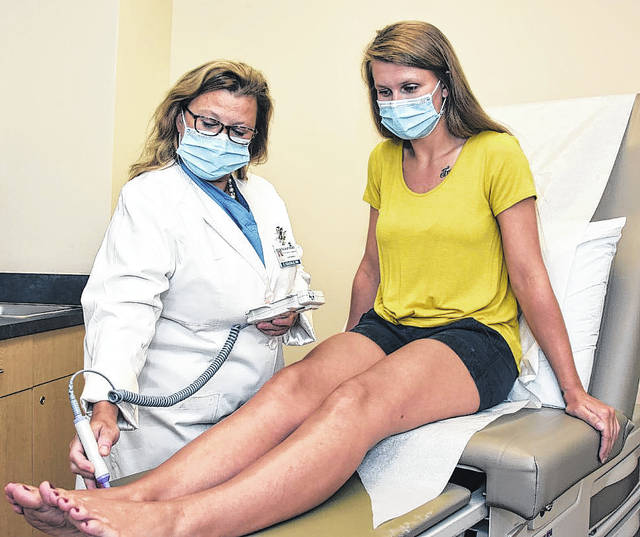It is troubling that patients with strokes, heart attacks and other emergent heath issues have not been seeking heath care due to concerns of COVID-19.
As a medical professional, it alarms me to see patients who desperately need care delay or go without it altogether. This is a distressing situation. Equally important are patients suffering from limb-threatening conditions, such as Peripheral Arterial Disease, especially those requiring prompt intervention by a vascular surgeon to prevent lower limb amputation.
Vascular disease such as Peripheral Arterial Disease is very often the reason for loss of blood flow to the leg and the eventual need for a preservation type of treatment if left untreated. Peripheral Arterial Disease affects 10 million Americans, and is a warning sign for potential stroke, heart attack, or a life-threatening aneurysm. Peripheral Arterial Disease is caused by blocked blood flow in the arteries of the legs. It typically affects people over age 50, but the risk increases with smoking, diabetes, high blood pressure, high cholesterol, and a history of heart disease.
Although many people know that chest pain and angina are signs of heart attack, most do not know that leg pain while walking or exercising can be a sign of clogged arteries in other parts of the body. These blocked leg arteries are what increases the risk for stroke, heart attack, or an aneurysm. As Peripheral Arterial Disease progresses to its most advanced stages, it causes a “heart attack in the legs” where arteries become so clogged and narrow, blood is prevented from flowing to the limbs.
But, by identifying PeripheralArterial Disease in its earliest stages, it can typically be treated through lifestyle changes or medications. Being screened for Peripheral Arterial Disease is easy, fast and painless through an Ankle Brachial Index, which is a comparison of the blood pressure of the ankle and the arm. Ideally, the leg pressure should be equal to or greater than the arm pressure within normal blood pressure limits.
The most common sign of Peripheral Arterial Disease is pain or cramping while walking that subsides with rest. Other signs include swelling, numbness, skin discoloration and sores that are slow to heal. Vascular disease is actually a very common disease.
Nearly half of Americans have some sort of vascular disease. When patients come to our McLeod Vascular Associates office and are diagnosed with vascular disease, they worry that they might lose their leg. The goal of the McLeod Vascular Surgeons is to work with patients in their early disease stages and prevent amputation whenever possible. If needed, there are minimally invasive techniques we can perform to improve circulation including vein bypass surgery.
For those with poor circulation, or who simply want to keep their circulation healthy, there are things that can help keep the blood flowing:
• The most important – if you smoke, quit. Nicotine harms the walls of the arteries and thickens the blood so much it can’t get through. Talk to your primary care physician if you need help with quitting.
• Maintain your blood pressure. A blood pressure that is too high causes a condition that hardens the arteries and chokes off blood flow. Aim for 120 over 80 or less but talk to your primary care physician about the best numbers for your age and health.
• Stay hydrated. Blood is about half water and it is important to remain hydrated to keep your blood moving. Make a goal of drinking eight glasses of water a day but increase that number if exercising or when it is hot outside.
• Sitting for long periods of time is bad for circulation. It weakens leg muscles and slows blood flow in the legs which can cause a blood clot. Getting on your feet periodically works the valves in the leg veins, sending the blood up to the heart. If on a long road trip, make sure you stop to take breaks for everyone to get out and stretch their legs.
• Aerobic exercise means “with oxygen.” Run, bike, walk, swim – take in more oxygen and move your muscles. Set a goal to exercise 30 minutes, five to seven days a week. Break exercise time into smaller chunks if it is easier to fit into your schedule.
Although it is important to understand the risks of COVID-19 exposure, you can have the comfort of knowing that you are in good, safe hands when you visit any McLeod Health facility for vascular care. If you are experiencing signs of vascular disease the physicians of McLeod Vascular Associates are here to help. Call 843-777-7043 to get treatment as soon as possible.
Dr. Eva Rzucidlo is a board-certified vascular surgeon with additional vascular research fellowship training. Dr. Rzucidlo cares for patients at McLeod Vascular Associates in Florence, Hartsville and Cheraw. For information on scheduling appointments, call 843-777-7043.


